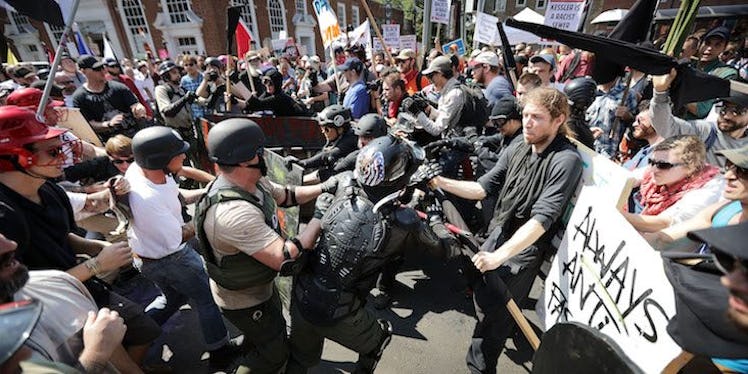
Trump Called Charlottesville Protesters The “Alt-Left”: Here’s What He Might Mean
President Donald Trump just doubled down on his original remarks about this weekend's violence in Charlottesville, Virginia. At a press conference at Trump Tower in New York City on Aug. 15, Trump reiterated his claim that “many sides” were to blame for the clashes at a white supremacist rally that left one dead, saying that the “alt-left” were as much to blame as the alt-right. And the choice of words left many people scratching their heads and asking, is the alt-left real?
Well, kind of. Trump's choice of words was roundly mocked on Twitter, because the phrase “alt-left” isn't really a thing. Though there's been a think piece or two using the term in the past, Trump seems to have just taken the phrase “alt-right” and turned it around. Which doesn't make a lot of sense.
The term alt-right, coined by white supremacist Richard Spencer in 2008, has played the part of a positive rebranding for members of the far right to avoid the bad publicity associated with being called a white supremacist, a white nationalist, a neo-Nazi, a racist, etc. The phrase has become a catch-all for any number of far-right groups promoting varying degrees of racism, misogyny, anti-Semitism, ethnocentrism, or other intolerance. (It's also a controversial phrase, among people who would prefer to call a Nazi a Nazi).
The left, on the other hand, hasn't really taken to the phrase. A liberal is just a liberal.
There is a group, however, Trump might have been talking about.
With the rise of the alt-right and the increase in white supremacist events and conflict, a far-left counter group has emerged, which call themselves Anti Facists, or Antifa for short.
Antifa's main goal is in the name itself: they're there to fight facism. Antifa uses militant protest methods to oppose racism, sexism, ethnonationalism, and other forms of discrimination, according to the BBC. They also tend towards anti-capitalism and anti-government, the BBC notes, and aren't really much for advocating left-wing policies. Like an Indiana Jones movie, they're all about punching Nazis.
Antifa groups, which have no central leadership, have come under fire for their willingness to commit violence. Antifa were involved in the protests against a speech by alt-right persona Milo Yiannopoulos at UC Berkeley in early February, when violent protesters started fires and smashed windows, according to CNN. Antifa organizer Scott Crow recently told CNN that the groups would use violence as self-defense. He said,
There is a place for violence. Is that the world that we want to live in? No. Is it the world we want to inhabit? No. Is it the world we want to create? No. But will we push back? Yes.
Antifa were also present in Charlottesville on Saturday — when violence broke out between white supremacists and counter protesters, leaving almost three dozen people injured, and one person dead.
The right wing has also moved to call them a terrorist organization. A change.org petition demanding that President Trump declare Antifa a terrorist organization has over 93,000 signatures.
Antifa's origins are murky, but it seems to go back to the rise of Nazism in the 1930s.
The name appears to have risen from an alliance between Communist and Social Democratic workers in Germany in 1932, per Jacobin Magazine, which has a detailed history of what's known about the movement and its development.
And while the popularity of the militant anti-facist groups has waxed and waned over years, their profile has definitely been on the rise since Donald Trump's election in 2016.
But are they more destructive than the right? Maybe not.
But while their willingness to engage in violence and property destruction has drawn a lot of attention, experts say that it's misleading to say that they're more violent than the far right.
Mark Pitcavage, a senior research fellow at the Anti-Defamation League's Center on Extremism, told NPR that though the far left is active, "it hasn't been particularly violent for some time." He also noted that right-wing factions or individuals were responsible for the majority of murders committed by extremists in the past decade.
So, "many sides?" Maybe. But those sides aren't necessarily equal.